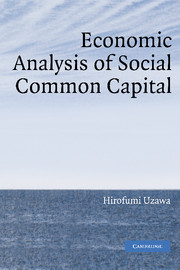Book contents
- Frontmatter
- Contents
- List of Figures
- Preface
- Introduction: Social Common Capital
- 1 Fisheries, Forestry, and Agriculture in the Theory of the Commons
- 2 The Prototype Model of Social Common Capital
- 3 Sustainability and Social Common Capital
- 4 A Commons Model of Social Common Capital
- 5 Energy and Recycling of Residual Wastes
- 6 Agriculture and Social Common Capital
- 7 Global Warming and Sustainable Development
- 8 Education as Social Common Capital
- 9 Medical Care as Social Common Capital
- Main Results Recapitulated
- References
- Index
7 - Global Warming and Sustainable Development
Published online by Cambridge University Press: 18 December 2009
- Frontmatter
- Contents
- List of Figures
- Preface
- Introduction: Social Common Capital
- 1 Fisheries, Forestry, and Agriculture in the Theory of the Commons
- 2 The Prototype Model of Social Common Capital
- 3 Sustainability and Social Common Capital
- 4 A Commons Model of Social Common Capital
- 5 Energy and Recycling of Residual Wastes
- 6 Agriculture and Social Common Capital
- 7 Global Warming and Sustainable Development
- 8 Education as Social Common Capital
- 9 Medical Care as Social Common Capital
- Main Results Recapitulated
- References
- Index
Summary
INTRODUCTION
The atmospheric concentration of greenhouse gases, particularly carbon dioxide, has been increasing since the Industrial Revolution, with an accelerated rate in the past three decades. According to the IPCC reports (1991a, 1992, 1996a, 2001a, 2002), it is estimated that if the emission of CO2 and other greenhouse gases and the disruption of tropical rain forests were to continue at the present pace, global average air surface temperature toward the end of the twenty-first century would be 3–6°C higher than the level prevailing before the Industrial Revolution, resulting in drastic changes in climatic conditions and the disruption of the biological and ecological environments.
The problems of global warming are genuinely dynamic. From past human activities we have inherited an excess concentration of atmospheric CO2, and the choices we make today concerning the use of fossil fuels and related activities significantly affect all future generations through the phenomenon of global warming that is brought about by the atmospheric concentrations of CO2 due to the combustion of fossil fuels today. Thus, we explicitly have to take into account the changes in the welfare levels of all future generations caused by the increases in the atmospheric accumulations of CO2.
In this chapter, we are primarily concerned with the economic analysis of global warming within the theoretical framework of dynamic analysis of global warming, as introduced in Uzawa (1991b, 2003).
- Type
- Chapter
- Information
- Economic Analysis of Social Common Capital , pp. 257 - 291Publisher: Cambridge University PressPrint publication year: 2005



